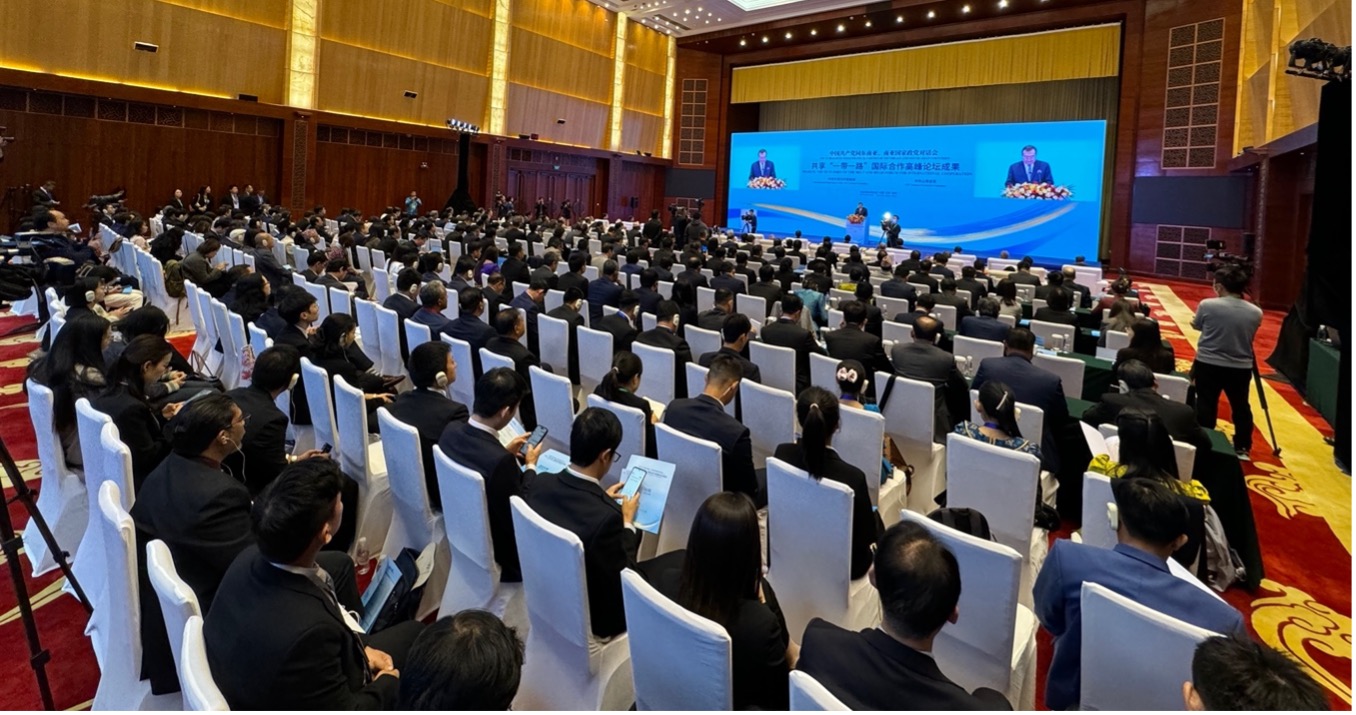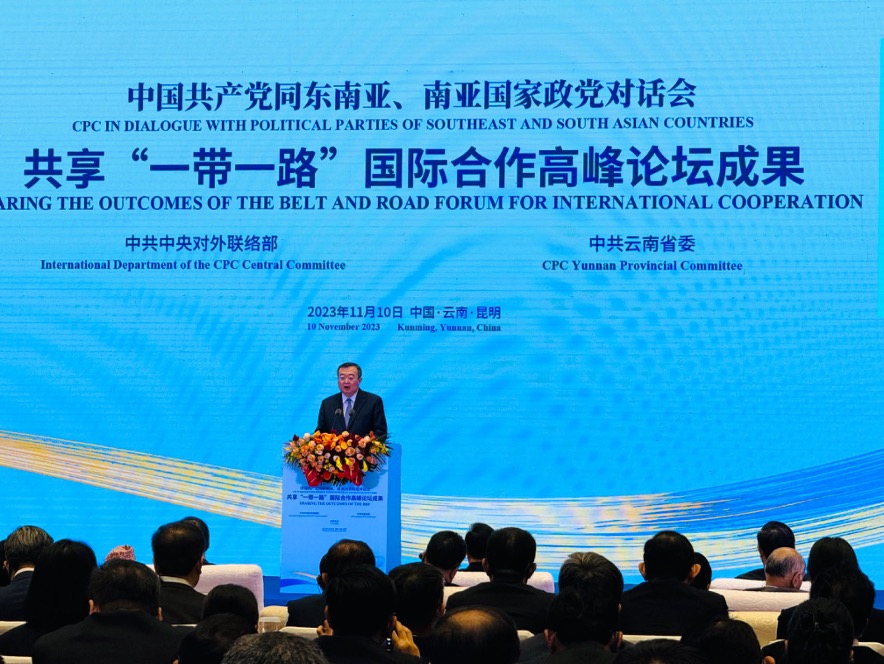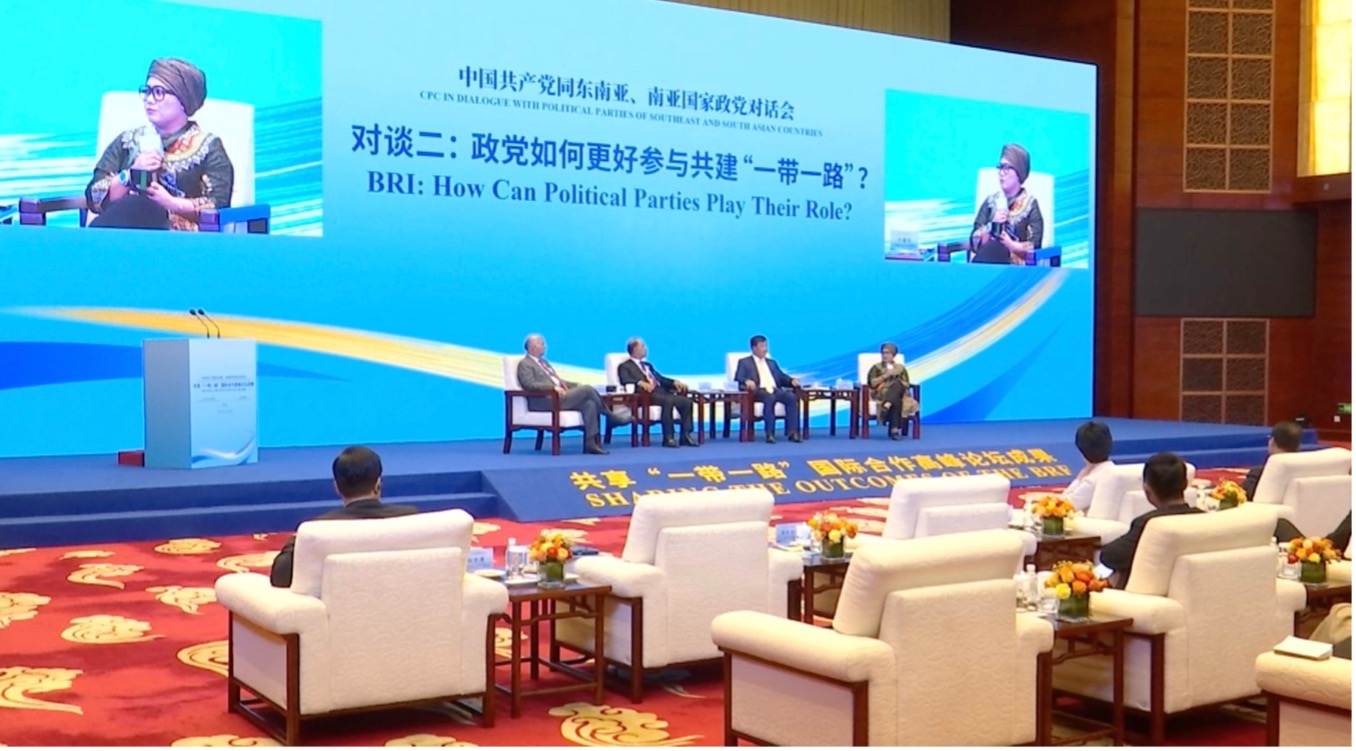
CPC in Dialogue with Political Parties of Southeast and South Asian Countries is held in the city of Kunming on Friday. /CGTN
CPC in Dialogue with Political Parties of Southeast and South Asian Countries is held in the city of Kunming on Friday. /CGTN
Representatives of political parties and think tanks from Southeast and South Asian countries gathered in the southwestern Chinese city of Kunming on Friday to discuss ways to strengthen cooperation with the Communist Party of China (CPC) under the Belt and Road Initiative.
The event follows last month's Belt and Road Forum for International Cooperation in Beijing, where Chinese President Xi Jinping, also general secretary of the CPC Central Committee, announced eight major steps to support high-quality Belt and Road cooperation. The dialogue explored the future of the BRI and how partner countries can share in its outcomes.
"The Communist Party of China upholds the concept of a community with a shared future for mankind. It does not pursue modernization in isolation but hopes to jointly realize the modernization of all countries through the BRI," said Liu Jianchao, minister of the International Department of the CPC Central Committee, at the opening ceremony.
Liu added that the CPC will work to strengthen bilateral and multilateral communications between political parties in the region, actively hold consultations to ensure policy continuity and stability, and align each other's development strategies.

Liu Jianchao, head of the International Department of the Communist Party of China Central Committee, delivers a keynote speech at the opening ceremony of the dialogue. /CGTN
Liu Jianchao, head of the International Department of the Communist Party of China Central Committee, delivers a keynote speech at the opening ceremony of the dialogue. /CGTN
Southeast and South Asian countries are active BRI participants. In recent years, some landmark BRI projects have gone into service, including the China-Laos Railway and the Jakarta-Bandung High-Speed Railway in Indonesia. These are playing a special role in boosting regional development. Some party leaders said they are eyeing greater cooperation with China under the BRI framework.
"Thailand is also trying to develop high-speed rail, and the government will provide strong support. We hope that Thailand can finance construction by itself, and we also hope to obtain technical support from China," said Pirapan Salirathavibhaga, leader of the United Thai Nation Party, who also serves as the deputy prime minister of Thailand.
Madhav Kumar Nepal, chairman of the Communist Party of Nepal (Unified Socialist), told CGTN that Nepal could learn more from China in the areas of agriculture, science and technology, and education.
"With collaboration under the initiative, we can know how to develop Nepalese agricultural output, and Nepal won't be only a country of importing food items or agriculture production. Rather, it will be a country that can export food products to different countries," said the politician, also the country's former prime minister.

Leaders of political parties of Southeast and South Asian countries discuss how political parties can play an active role in facilitating BRI cooperation. /CGTN
Leaders of political parties of Southeast and South Asian countries discuss how political parties can play an active role in facilitating BRI cooperation. /CGTN
The dialogue also discussed political parties' role in facilitating BRI cooperation.
"Although each political party has its own characteristics, we all have a common goal, which is to promote national development. I believe that the CPC will play an important role in promoting regional peace and expanding regional cooperation," said Salirathavibhaga.
The guests refuted accusations that label the BRI a "debt trap," which has been hyped up by some Western media outlets. They agreed that in the face of global challenges, including poverty, climate change and public health crises, only through such collaboration can different countries seek common development.
"All the challenges give a message to us that we have to sit together, live together, work together, and share together, so that our destiny will be safe," said Nepal.
China also promised a slew of concrete measures to enhance exchanges at the event.
"In the next five years, we plan to provide 3,000 places for political parties in Southeast and South Asian countries to visit China and will actively support young people from all political parties to come to China for inspections, exchange, and study," said Liu Jianchao. "We are also willing to send more Chinese experts to various countries for exchanges."
Liu noted that a series of cooperative projects in terms of poverty reduction, ecological protection, employment and health will be carried out for the wellbeing of the people of the region.




